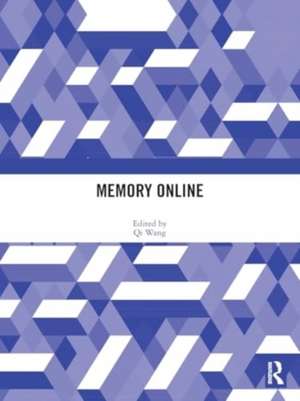Memory Online
Editat de Qi Wangen Limba Engleză Paperback – 26 aug 2024
These studies employ innovative and rigorous methodological approaches that are ecologically valid in the online context. Their findings reveal complex and dynamic characteristics of human memory in a digitally mediated world that shapes our learning, our sense of self, and our beliefs and decision making. Collectively, the chapters in this volume provide rich theoretical insights into the workings and functions of memory. This book ushers in a new era of research on memory in the age of digitization.
Memory Online will be a beneficial read for students and scholars of Psychology, Cognitive Science, Communication, and Media Studies. The chapters in this book were originally published as a special issue of Memory.
Preț: 382.16 lei
Nou
Puncte Express: 573
Preț estimativ în valută:
73.12€ • 76.17$ • 60.96£
73.12€ • 76.17$ • 60.96£
Carte tipărită la comandă
Livrare economică 28 martie-11 aprilie
Preluare comenzi: 021 569.72.76
Specificații
ISBN-13: 9781032412917
ISBN-10: 1032412917
Pagini: 150
Dimensiuni: 210 x 280 mm
Greutate: 0.28 kg
Ediția:1
Editura: Taylor & Francis
Colecția Routledge
Locul publicării:Oxford, United Kingdom
ISBN-10: 1032412917
Pagini: 150
Dimensiuni: 210 x 280 mm
Greutate: 0.28 kg
Ediția:1
Editura: Taylor & Francis
Colecția Routledge
Locul publicării:Oxford, United Kingdom
Public țintă
Academic, Postgraduate, and UndergraduateCuprins
Introduction: Memory Online 1. Information without knowledge: the effects of Internet search on learning 2. Pretesting can be beneficial even when using the internet to answer questions 3. The gist of it: offloading memory does not reduce the benefit of list categorisation 4. On our susceptibility to external memory store manipulation: examining the influence of perceived reliability and expected access to an external store 5. Replicating autobiographical memory research using social media: a case study 6. Remembering online and offline: the effects of retrieval contexts, cues, and intervals on autobiographical memory 7. Why do people share memories online? An examination of the motives and characteristics of social media users 8. Persistence of false memories and emergence of collective false memory: collaborative recall of DRM word lists 9. Deepfake false memories 10. He did it! Or did I just see him on Twitter? Social media influence on eyewitness identification
Notă biografică
Qi Wang is Professor of Human Development, Psychology, and Cognitive Science at Cornell University, USA. Her research focuses on the impact of cultural forces – including the Internet and social media – on memory and psychosocial functioning. She is the author of The Autobiographical Self in Time and Culture (2013).
Descriere
This book addresses the influence of digital age on remembering in three broad areas: offloading memory and associated costs, benefits, and boundary conditions; autobiographical memory online; and false memory at a time of fake news and misinformation. The chapters were originally published as a special issue of Memory.
